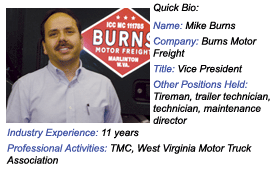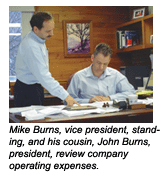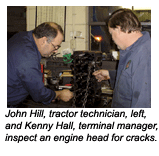Mike Burns of Burns Motor Freight started at the bottom to learn the business, earn respect and understand employees’ jobs.
Mike Burns won’t ask any employees to do a job that he hasn’t already done himself. Burns, vice president of family-owned and operated Burns Motor Freight in Marlinton, W.Va., says it’s important to have lived – not just understand – the jobs he expects employees to complete.
That’s why after graduating from West Virginia University with a business management degree and working in the poultry business for five years, he started over at the entry level in the family business.
“I started at the bottom changing tires, greasing trucks, changing brakes, fabricating, side cutting and welding,” he says. “I worked on the tractor side and I also learned about engines. I wasn’t the best, but I learned and earned people’s respect. Now, when drivers calls me at 3 a.m. with a problem, I know what they are talking about. You have to start at the bottom to learn and understand the entire business.”
Burns said he decided to join the family business in 1996 when his father started talking about retirement. Burns’s grandfather, Fred C. Burns, started the business in 1949. It was taken over by the founder’s three sons – Fred Jr., Larry and Tom – and incorporated in 1964.
Other family members working in the business today include Mike’s cousins – John Burns, president; Doug Burns, safety director; David, driver – and Mike’s sister, Carrie, who is an assistant in the maintenance department.
The company tries to offer a friendly, open atmosphere among its 120 employees in rural West Virginia, according to Mike Burns.
“I like to promote an informal and open communications policy,” he says. “I’ll hang out with the guys and let them know I appreciate their effort when they do a good job. If I have a problem with somebody, I’ll discuss that in the office behind closed doors. I don’t want to humiliate anybody in front of their peers and bring down morale throughout the entire organization.”
Hiring, keeping employees
The company’s three truck terminals are located in eastern West Virginia, about three hours east of state capital Charleston. Technicians there service the company’s 105 Class 8 trucks and 260 trailers, which serve the eastern part of the United States. The remote locations make recruiting talented and experienced employees a challenge.
“It’s tough to hire good, experienced technicians in this area,” Mike Burns says. “The main employers are the lumber mills and a ski resort near Snowshoe, W. Va. We don’t have any nearby junior colleges or technical colleges to draw from, so we partner with the local schools.”
Job shadowing is done with the local high school and grade school to give students an idea of what it’s like to work in the industry.
“The students come in at 7 a.m. and stay with technicians all day, including breaks and lunch periods,” he says. “These kids get a good opportunity to learn what it’s like to work here and elsewhere.”
The company will hire students out of high school and start them in an entry-level position to learn the business. It also will invest in talented employees who want to expand their horizons.
“If a technician shows the potential to be a manager by showing leadership abilities and has a desire to move up, we will try to develop that and encourage them to grow,” Mike Burns says. “In February, I’m sending a new technician to Mack’s North American Technical School in Allentown, Pa. He’s an entry-level technician, but he wants to get as much knowledge as he can. Some technicians are not anxious to get new training. Some technicians take more persuading than others.”
The company also takes advantage of on-site training from several suppliers, including Mack, Eaton, Webasto, ArvinMeritor, Horton and Chicago Rawhide.
“We like to do training in small sessions because it encourages an open exchange and more feedback,” Mike Burns says. “We try to enroll as many technicians as possible in appropriate on-site training.”
Both on- and off-site training is done on company time while technicians are on the clock, he says.
The company relies on feedback from drivers and technology to help manage maintenance. Drivers are encouraged to complete vehicle maintenance reports on the operating condition of the trucks. Burns Motor Freight also uses McLeod Software, which is tied into the maintenance department.
“The LoadMaster software generates maintenance tickets and reports to tell us when we need to get the truck into the terminal for preventive maintenance,” Mike Burns says. “It also tells us what parts to order.”
The company also uses a Qualcomm satellite communications system to communicate between drivers and dispatch. It is tied into the electronics of the trucks and will track speed, idle time and other information. It also allows the company to track loads to within 25 miles of its location.
